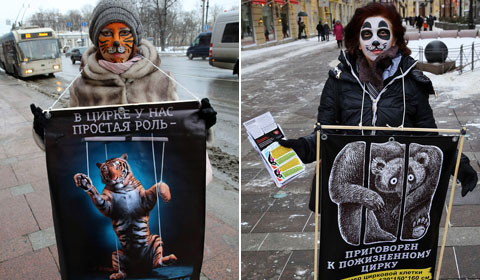Koreas reach out for family reunions
Updated: 2014-02-06 01:23
(AGENCIES / China Daily)
|
||||||||
60 years, little contact
Millions of Koreans were separated by the 1950-53 war, and the vast majority have since died without having any communication at all with surviving relatives.
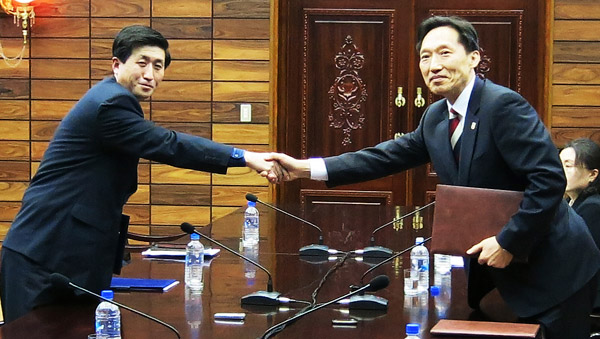 |
|
Head of the North Korean working-level delegation, Park Yong-il (L), shakes hands with his South Korean counterpart Lee Duk-haeng after they exchanged agreements during their talks in the truce village of Panmunjom February 5, 2014. [Photo/Agency] |
Because the Korean conflict concluded with an armistice rather than a peace treaty, the two Koreas technically remain at war and direct exchanges of letters and telephone calls are prohibited.
Up to 73,000 ROK citizens are wait-listed for a chance to take part in one of the reunion events, which select only a few hundred participants at a time.
The reunion program began in earnest in 2000 following a historic inter-Korean summit. Sporadic events since then have seen around 17,000 relatives briefly reunited.
But the program was suspended in 2010 following the DPRK's shelling of an ROK border island.
Pyongyang wants Seoul to resume regular tours to Mount Kumgang, which had provided a valuable source of hard currency in the past.
Seoul suspended the tours after a woman tourist was shot dead by DPRK security guards in 2008, and it has repeatedly rejected any efforts to link their resumption to the family reunion issue.
Pyongyang is also pushing for a resumption of Six-Party Talks on its nuclear program — a long-stalled process involving the two Koreas, China, Japan, Russia and the United States.
Seoul and Washington insist substantive dialogue can only begin after Pyongyang demonstrates a tangible commitment to abandoning its nuclear weapons program.
Past family reunions have been hugely emotional — almost traumatic — affairs, with many of the elderly participants breaking down and sobbing as they cling to each other.
The events typically last several days and the joy of the reunion is tempered by the pain of the inevitable — and this time permanent — separation at the end.

 Chinese Lunar New Year gift from abroad
Chinese Lunar New Year gift from abroad
 Koreas reach out for family reunions
Koreas reach out for family reunions
 Storm to slam two-thirds of US
Storm to slam two-thirds of US
 Clowns gather for Joseph Grimaldi celebration
Clowns gather for Joseph Grimaldi celebration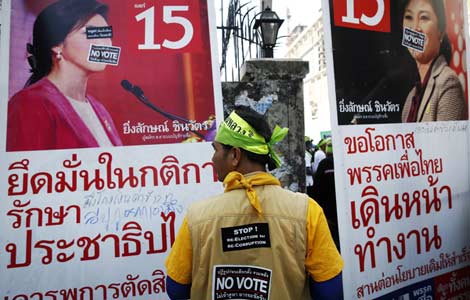
 Thai caretaker PM urges protesters not to block voting
Thai caretaker PM urges protesters not to block voting
 Holy waters in Nepal
Holy waters in Nepal
 Kongfu stars wax shine in London ChinaTown
Kongfu stars wax shine in London ChinaTown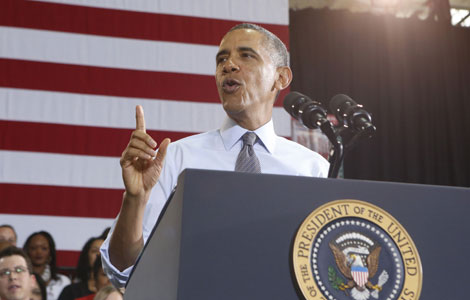
 Obama pushes minimum wage hike
Obama pushes minimum wage hike
Most Viewed
Editor's Picks

|
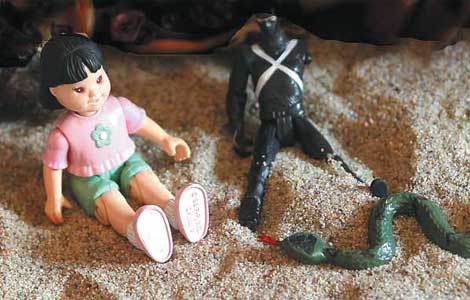
|

|

|

|

|
Today's Top News
Schroeder accuses US of disrespect over sovereignty
US warns airlines about 'toothpaste bombs'
Xi leaves for Sochi ceremony Thursday
US criticism over ADIZ unfounded
Murderer of China students sentenced
China reports 11 H7N9 cases
Data show rebalancing, not weakness: economist
US envoy counsels restraint
US Weekly

|

|


